#Rail Safety
Text
Big Train managers earn bonuses for greenlighting unsafe cars
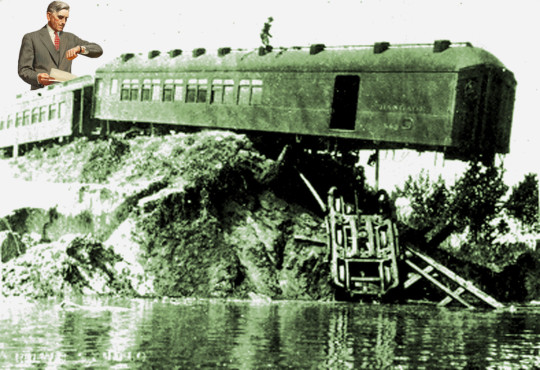
Tomorrow (November 16) I'll be in Stratford, Ontario, appearing onstage with Vass Bednar as part of the CBC IDEAS Festival. I'm also doing an afternoon session for middle-schoolers at the Stratford Public Library.

Almost no one knows this, but last June, a 90-car train got away from its crew in Hernando, MS, rolling three miles through two public crossings, a ghost train that included 47 potentially explosive propane cars. The "bomb train" neither crashed nor derailed, which meant that Grenada Railroad/Gulf & Atantic didn't have to report it.
This is just one of many terrifying near-misses that are increasingly common in America's hyper-concentrated, private equity-dominated rail sector, where unsafe practices dominate and whistleblowers face brutal retaliation for coming forward to regulators.
These unsafe practices – and the corporate policies that deliberately gave rise to them – are documented in terrifying, eye-watering detail in a deeply reported Propublica story by Topher Sanders, Jessica Lussenhop,Dan Schwartz, Danelle Morton and Gabriel L Sandoval:
https://www.propublica.org/article/railroad-safety-union-pacific-csx-bnsf-trains-freight
It's a tale of depraved indifference to public safety, backstopped by worker intimidation. The reporting is centered on railyard maintenance inspectors, who are charged with writing up "bad orders" to prevent unsafe railcars from shipping out. As private equity firms consolidated rail into an ever-dwindling number of companies, these workers face supervisors who are increasingly hostile to these bad orders.
It got so alarming that some staffers started carrying hidden digital recorders, so they could capture audio of their bosses illegally ordering them to greenlight railcars that were too unsafe for use. The article features direct – and alarming – quotes, like supervisor Andrew Letcher, boss of the maintenance crews at Union Pacific's Kansas City yard saying, "If I was an inspector on a train I would probably let some of that nitpicky shit go."
Letcher – and fellow managers for other Tier 1 railroads quoted in the piece – aren't innately hostile to public safety. They are quite frank about why they want inspectors to "let that nitpicky shit go." As Letcher explains, "The first thing that I’m getting questioned about right now, every day, is why we’re over 200 bad orders and what we’re doing to get them down."
In other words, corporate rail owners have ordered their supervisors to reduce the amount of maintenance outages on the rail lines, but have not given them additional preventative maintenance budgets or crew. These supervisors warn their employees that high numbers of bad orders could cost them their jobs, even lead to the shutdown of the car shops where inspectors are prone to pulling dangerous cars out of service.
It's a ruthless form of winnowing. Gresham's Law holds that "bad money drives out good" – in an economy where counterfeit money circulates, people preferentially spend their fake money to get it out of their hands, until all the money in circulation is funny money. This is the rail safety equivalent: simply fire everyone who reports unsafe conditions and all your railcars will be deemed safe, with the worst railcars shipped out first. A market for lemons – except these aren't balky used sedans, they're unsafe railcars full of toxic chemicals or explosive propane.
When cataclysmic rail disasters occur – like this year's East Palestine derailment – the rail industry reassures us that this is an isolated incident, pointing to the system's excellent overall safety record. But that record is a mirage, because the near-misses don't have to be reported. Those near-misses are coming more frequently, as the culture of profit over safety incurs a mounting maintenance debt, filling America's rails with potential "bomb cars."
Rail mergers and other forms of deregulated, anything-goes capitalism are justified by conservative economists who insist that "incentives matter," and that the profit motive provides the incentive to improve efficiency, leading to lower costs and better service. But the incentive to externalize risk, kick the can down the road, and capture regulators rarely concerns the "incentives matter" crowd.
Here's an incentive that matters. Rail managers' bonuses – as much as a fifth of their take home pay – are only paid if the trains they oversee run on time. Inspectors have recorded their managers admitting that they have quotas – a maximum number of bad orders their facility may produce, irrespective of how much unsafe rolling stock passes through the facility.
Inspectors have caught their managers removing repair order tags from cars they've flagged as unsafe. Inspectors will log orders in a database, only to have the record mysteriously deleted, or marked as serviced when no service has occurred. Some inspectors have seen the same cars in their yard with the same problems, and repeatedly flagged them without any maintenance being performed before they're shipped out again.
Former managers from Union Pacific, CSX and Norfolk Southern told Propublica that they operated in an environment where safety reports were discouraged, and that workers who filed these reports were viewed as "complainers." Workers furnished Propublica with recordings of rail managers berating them for reporting persistent unsafe conditions the Federal Railroad Administration. Other workers from BNSF said that they believed that their bosses were told when they called the company's "confidential" work-safety tipline, setting them up for retaliation by bosses who'd falsified safety reports.
Whistleblowers who seek justice at OSHA are stymied by long delays, and while switching their cases to court can win them cash settlements, these do not get recorded on the company's safety record, which allows the company to go on claiming to be a paragon of safety and prudence.
The culture of retaliation is pervasive, which explains how the 47-cars worth of propane on the "bomb train" that rolled unattended over three miles of track never made the news. There is a voluntary Close Call Reporting System (operated by NASA!) where rail companies can report these disasters. Not one of America's Class 1 rail companies participate in it.
After the East Palestine disaster, Transport Secretary Pete Buttigieg pushed the rail companies to join, but a year later, none have. It's part of an overall pattern with Secretary Buttigieg, who has prodigious, far-reaching powers under USC40 Section 41712(a), which allow him to punish companies for "unfair and deceptive" practices or "unfair methods of competition":
https://pluralistic.net/2023/01/10/the-courage-to-govern/#whos-in-charge
Buttigieg can't simply hand down orders under 41712(a) – to wield this power, he must follow administrative procedures, conducting market studies, seeking comment, and proposing a rule. Other members of the Biden administration with similar powers, like FTC chair Lina Khan, arrived in office with a ranked-priority list of bad corporate conduct and immediately set about teeing up rules to give relief to the American public.
By contrast, Buttigieg's agency has done precious little to establish the evidentiary record to punish the worst American companies under its remit. His most-touted achievement was to fine five airlines for saving money by cancelling their flights and stranding their passengers. But of the five airlines affected by Buttigieg's order, four were not US companies. The sole affected US carrier was Spirit airlines, with 2% of the market. The Big Four US airlines – who have a much worse record than the ones that were fined – were not affected at all:
https://prospect.org/infrastructure/transportation/ftc-noncompete-airline-flight-cancellation-buttigieg/
Rather than directly regulating the US transportation sector, Buttigieg prefers exacting nonbinding promises from them (like the Tier 1 rail companies' broken promise to sign up to the Close Call Reporting System). Under his leadership, the Federal Railroad Agency has proposed weakening rail safety standards, rescinding an order to improve the braking systems on undermaintained, mile-long trains carrying potentially deadly freight:
https://pluralistic.net/2023/02/11/dinah-wont-you-blow/#ecp
The US transportation system is accumulating a terrifying safety debt, behind a veil of corporate secrecy. It badly demands direct regulation and close oversight.
If you are interested in rail safety, I strongly recommend this episode of Well There's Your Problem, "a podcast about engineering disasters, with slides" – you will laugh your head off and then never sleep again:
https://www.youtube.com/watch?v=0BMQTdYXaH8

If you'd like an essay-formatted version of this post to read or share, here's a link to it on pluralistic.net, my surveillance-free, ad-free, tracker-free blog:
https://pluralistic.net/2023/11/15/safety-third/#all-the-livelong-day
#pluralistic#safety third#safety#whistleblowers#trains#railroad#rail safety#propublica#east palestine#monopoly#osha#bnsf#csx#bad orders#federal railroad administration#fra#association of american railroads#norfolk southern#union pacific#incentives matter#bomb train#Confidential Close Call Reporting System
160 notes
·
View notes
Text
LASER TRAIN
LASER TRAIN
LASER TRAIN!!!
For transit agencies in the eastern portion of the U.S., the leaves falling off the trees can be a problem for their railways. Leaves have a slippery substance on them called pectin and, when crushed beneath the wheels of a passing train, said pectin can present a hazard to safety and operations by reducing friction between the wheels and rail. This condition can result in flat spots on wheels, higher maintenance costs, unsafe braking and even derailments.
Three different East Coast transit agencies -- Metropolitan Transportation Authority’s (MTA) Metro-North Railroad in New York, New Jersey Transit (NJ Transit) in New Jersey and Southeastern Pennsylvania Transportation Authority (SEPTA) in Philadelphia, Pa., have recently started using new equipment to clean the tracks of pectin to ensure trains continue operating safely and reliably.
The MTA’s Metro-North Railroad uses its laser train to clean the tracks. The laser train was introduced by Long Island Rail Road in 2017 before Metro-North began using the train on a trial basis in 2022. During the pilot, Metro-North Railroad safely cleaned more than 12,000 miles of track with the laser train, which resulted in a 40 percent reduction in slip-slide events.
The train operates on the Hudson Line, the Harlem Line and the New Haven Line and can travel at speeds up to 60 mph. Two three-kilowatt lasers are mounted on each side of the train to put down an approximate 1.2-inch cleaning band.
LASERS!!!!
also dead at the previous rail cleaner is called "Waterworld".
27 notes
·
View notes
Text
I don't often get C-PTSD flashbacks from reading ProPublica news articles. I'm going to have to spend some time breathing deliberately and/or take a sleeping pill and go back to bed.
I'm autistic. Job hunting was hell for me at the best of times because I've never met a Human Resources employee who wasn't bigoted against the mentally ill. "You're perfectly qualified for the job, but I just don't think you'd be a good fit." So every job hunt I've ever had, even in boom times, has taken me a year or more to find someone who knew me, personally or professionally from a previous job, who had an opening and could pull rank on H.R. to get me in. And every job ended the same way: I got transferred to a disability-hostile manager ("it's not fair to everyone else if I treat you differently") and almost immediately fired. So threatening to fire me is only one step down from threatening to try to kill me.
And I've been threatened with being fired way more times than I've actually been fired. I'm a naturally scrupulous person, especially when safety issues are involved because I can't not worry, but also I know I'm really bad at telling when the people around me think the rules matter and when they don't (and worse at caring about their feelings about it being okay to break the rules this time). And I have long-since lost track of how many times I've been confronted with the choice:
Either commit a crime that puts people in danger ...
Or else we'll fire you, and you'll have to explain to every human resources department you apply at that you were fired for disobeying an order.
God, I hate this species. "I don't care if it's unsafe or illegal, I need it done." "Everybody cheats, if you don't cheat you can't make money." "We've gotten away with it before, it'll be fine." And "if other people die, they die; it's more important to get the job done." Fuck fuck fuck, I hate it. 'Cause it's real cheap of them to say when they're not going to be the one who gets hurt, isn't it? It's not like their families are going to get killed when (not if) a train derails, so who cares?
Some outlet I read (I think it was the WaPo?) did a long series about whistleblowing a little while back and concluded that most of us won't even say we want more whistleblowers, and most of the people who say they do don't mean it, certainly not when it comes to their own misdeeds. In one of the articles in the series, they cited moral foundations theory and suggested that that's because almost half of us rank "loyalty" above most or all other virtues. As in yes honesty and safety are virtues, but loyalty to your employer, your team, whatever is a more important virtue.
Fuck that. If I've let myself get peer pressured or tricked or bullied into doing something (or worse, ordering something) illegal and unsafe, I want subordinates who'll call me on my bullshit, hold me accountable. I need backup, everybody needs backup! Retaliate against whistleblowers? Fuck that noise; if I were in a position to hire, I'd offer extra to hire people who'd blown the whistle on misconduct to the point where they got fired for it -- I may not be able to trust them to "have my back" (which I don't even want when I'm in the wrong!) but I can trust them to tell the truth and protect others.
Obviously this means I've never worked in H.R. And it probably overlaps heavily with why my last real, professional employer finally told me I'd never make management. And shortly thereafter fired me. In a straight-up case of whistleblower retaliation. And then went so far as to lie to every potential employer I applied to that I was fired for "making terroristic threats," a straight-up frame-up that guaranteed that I'd never work in my industry again.
7 notes
·
View notes
Text
As Rail Profits Soar, Blocked Crossings Force Kids to Crawl Under Trains to Get to School
When trains block a crossing for hours on end, kids risk their lives to get to school.
The stopped trains also prevent ambulances and fire trucks from helping people in an emergency.
The problem of blocked crossings has existed for decades.
But it’s getting worse.

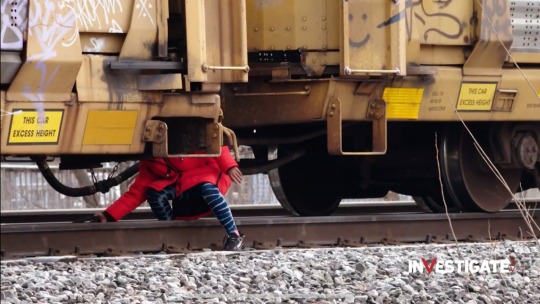
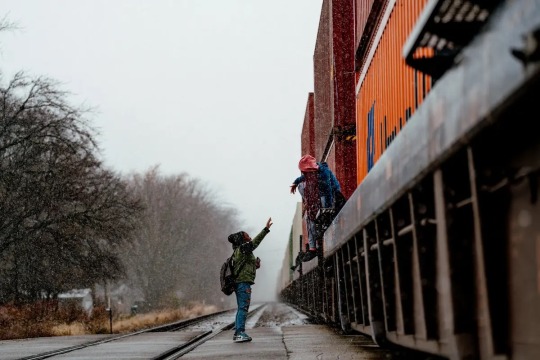
26 notes
·
View notes
Text
7 notes
·
View notes
Text
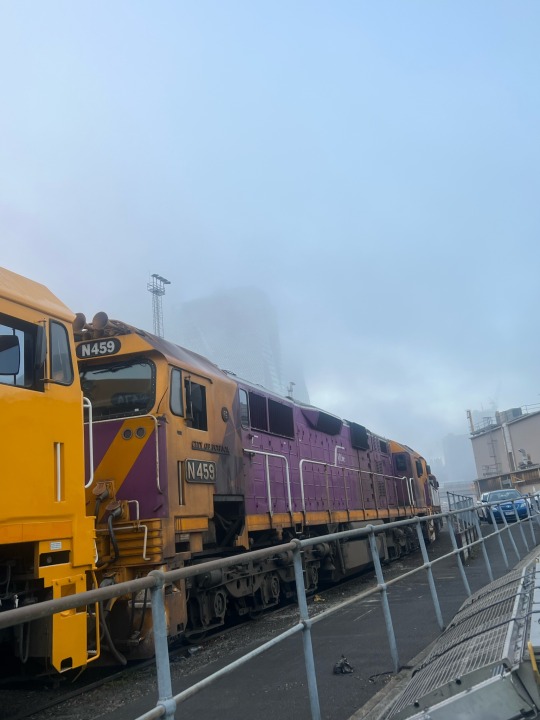
Frosty morning at the depot 🥶🥶🥶
4 notes
·
View notes
Text
UK: RSSB Published Refreshed Rail Health and Safety Strategy
The Rail Safety and Standards Board (RSSB) has unveiled an updated Rail Health and Safety Strategy for the UK.
This publication aims to ensure the continued safety and well-being of passengers and employees within Britain’s railway network.
Today’s railway is facing significant challenges in cost, performance and reliability
© Canva
Britain’s railway is among the safest in the world, but it is…
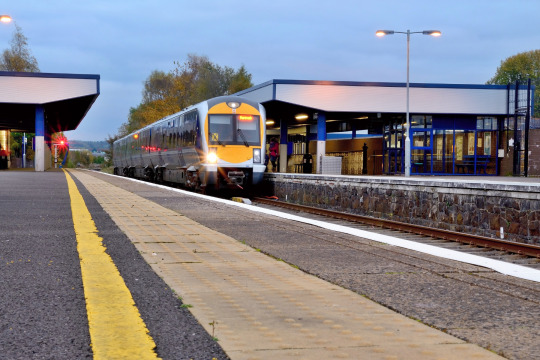
View On WordPress
0 notes
Text
The Vital Role of Compliance Testing in Rail Systems
In the intricate web of rail systems, the vital role of compliance testing cannot be overstated. Compliance testing stands as the linchpin for maintaining the integrity of rail systems, ensuring they adhere to rigorous safety standards and regulatory requirements.
Rail compliance, encompassing infrastructure, signaling, and operational practices, is crucial for preventing accidents and ensuring the smooth operation of rail networks. Rigorous testing protocols scrutinise various components, from tracks to signaling systems, addressing potential vulnerabilities and enhancing overall rail safety.
A harmonised approach to compliance testing is essential for the seamless functioning of rail systems, as vehicles operating within these networks must also adhere to stringent safety and regulatory standards. As rail systems evolve to meet modern demands, the emphasis on comprehensive compliance testing emerges as a proactive strategy, safeguarding both the rail infrastructure and the vehicles that traverse it.
0 notes
Text
1 note
·
View note
Link
#republicans#politics#fuck republicans#veterans#Veterans Affairs#Housing Choice Vouchers#child care#eviction#Meals on Wheels#WIC nutritional assistance program#pell grants#air traffic control towers#rail safety#FBI#employment#job training
0 notes
Text
President Joe Biden’s effort to toughen railroad safety regulations is setting up a collision with an industry used to getting its way in Washington.
Just three months ago, Biden bowed to the industry’s economic heft by blocking a threatened strike by freight rail workers, a move that angered many of the president’s labor supporters. That move came amid the industry’s warnings that a work stoppage would devastate the economy by choking off vital supplies such as grain, fuel and drinking water chemicals.
0 notes
Text

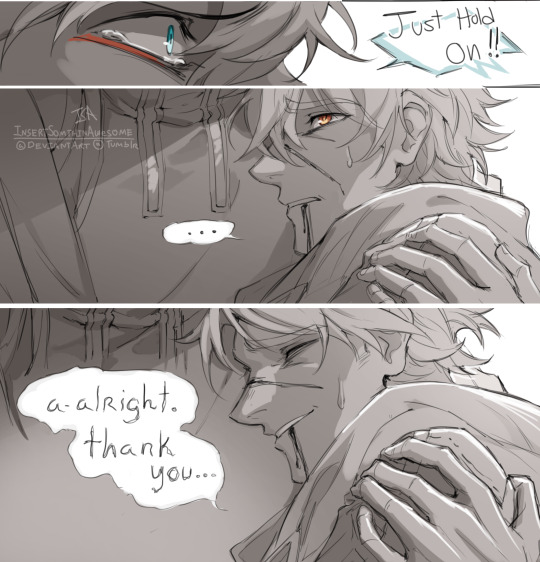
Whumptober No.1 - Safety Net
In my head this might be something that happens pre-canon.... and like. Welt was out of it enough that he's not sure if he dreampt up the tail and horns. And when he's better he decides its none of his business if it was real.
Dan Heng is DEFINITELY Jumpy afterwords (Both in the "Mr. Yang are you okay ;_;" Sense and the "Did I just out myself" Sense) and the fact taht Yang doesn't seem bothered helps settles his nerves ;;v;;
-NO ROMANCE INCLUDED-
#Whumptober2023#No.1#Safety Net#Honkai Star Rail#digital art#blood#injury#Whumptober#Welt yang#Dan Heng#Inbibitor Lunae Dan Heng#Welt yang hsr#Dan Heng hsr#Honkai Star Rail Spoilers#isa's fanart#InsertSomthinAwesome#October2023#Dan Heng and Welt are very important to me....#imagine being part of an eternally reincarnating species and boom you get a dad figure#Soft for Welt standing up for and caring about Dan heng#Soft for Dan Heng not understanding the bond he has with Welt but at the same time caring about him#Also Man welt would get it alsdkjflKSDJGLSD he's seen some stuff#As goes for all my Whumptobers!!! This has a happy ending!! I simply do not draw it!! Or we would be here all day SDFLKJSDLKGJSDG
865 notes
·
View notes
Text
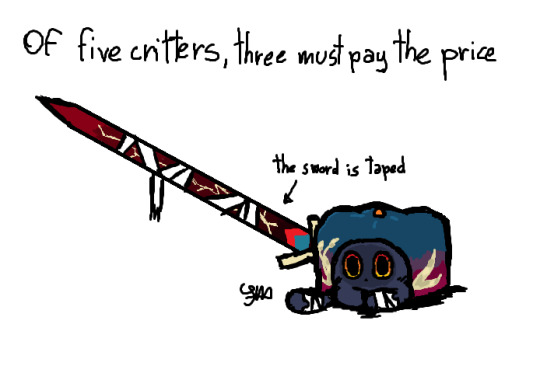
the real question is if sesame cake can even wield shard sword (the thing is ridicolously heavy)
also this is inspired by that kirby wielding a sword meme

#doodle#shitposting#honkai star rail#hsr#hsr blade#mochi's art#i'm going to move rice dumpling to safety just in case
190 notes
·
View notes
Text
give me chaotic dan heng. give me dan heng who would do the most absolutely wild shit if he thinks its justified. give me dan heng who would deck someone on sight for picking on march. give me dan heng who would narrowly avoid an assault charge after hearing a researcher insult the trailblazer’s intelligence. give me dan heng who would offer to cause trouble so bailu can run off and play and have the childhood he never had
pls give me chaotic dan heng
#pls this is the man who got in a fucking CAGE FIGHT within like 2 days of arriving in belobog#but thats just canon dan heng?#i know i miss him#give me back my stupid emotionally stunted dragon man#honkai star rail#hsr#dan heng#hsr dan heng#dan heng my beloved#dan heng imbibitor lunae#danheng my beloved#danheng#dan heng honkai star rail#honkai dan heng#dan heng hsr#i miss the trailblaze trio. give me back my sillies :(#hes like hermione i absolutely believe he would set someone on fire if it meant the safety of his friends
127 notes
·
View notes
Text

i finally played argenti's story quest... i hope when velite is a pilot they can journey together
#honkai star rail#argenti#hsr argenti#argenti x velite#if that even is a tag hkffjhdjffk#this is the worst tumblr has ever obliterated the quality even tho the canvas is from the same canvas preset i use for all my drawings#and im really sad bc this is like my fave thing ive ever drawn lmao ⚰️⚰️⚰️⚰️#idk how to fix it i hope you can enjoy it anyway#yeah doing that quest i was like why is hoyo making me feel so much for a pc x npc pairing 😭#i know the knights are loners and argenti was like my fate is to wander the cosmos alone but im like... what if you didnt have to <3#the concept here was what if he gently carried velite to safety when he rescued him
31 notes
·
View notes
Text
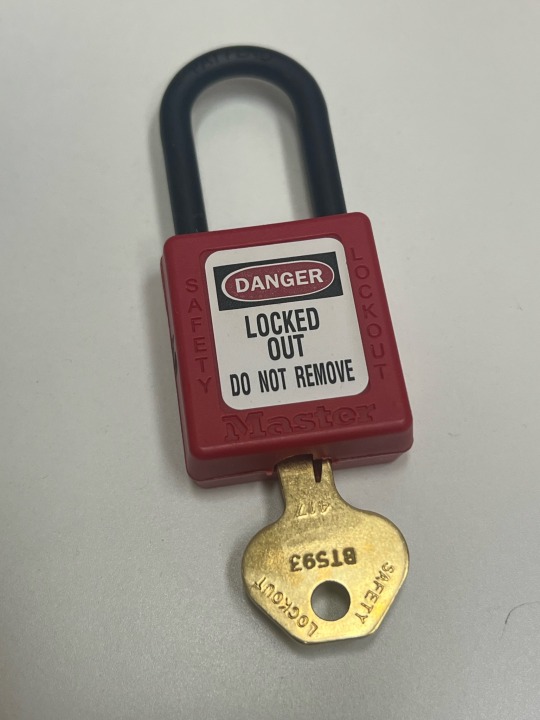
What is the significance of this lock?
You could say it is a “key” part of railway road safety. When a train requires maintenance and is coming in to the depot, the road it is travelling on is required to be secured shortly after arrival in addition to shutting down the engine and chocking .
On each road is a lock box where maintenance personnel working on the particular road put their lock on and have a photo identifying the lock owner and remove the key so no one can remove the lock and unlock the road. By putting locks on and taking the keys with each person with the lock , it is a fail safe system to ensure the road cannot be unlocked and put personnel working on the train in danger .
There are different coloured locks representing different maintenance personnel working on the train
Red -Employee locks (like in the above photo)
Orange -Contractors
Black-Master lock that can unlock the other locks
Green- Shift supervisor’s lock that goes in the inside of the lockbox and can’t be taken out until each individual lock is taken off on the outside
Purple- Represents a shift change over
1 note
·
View note